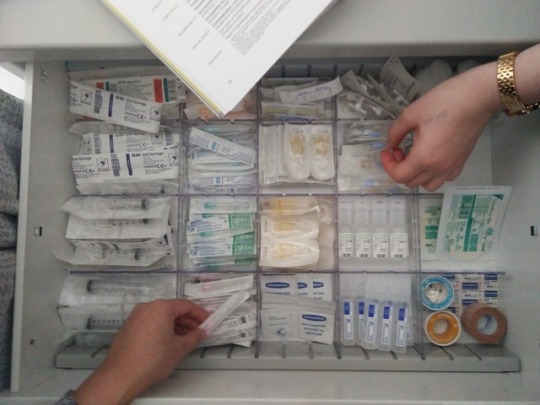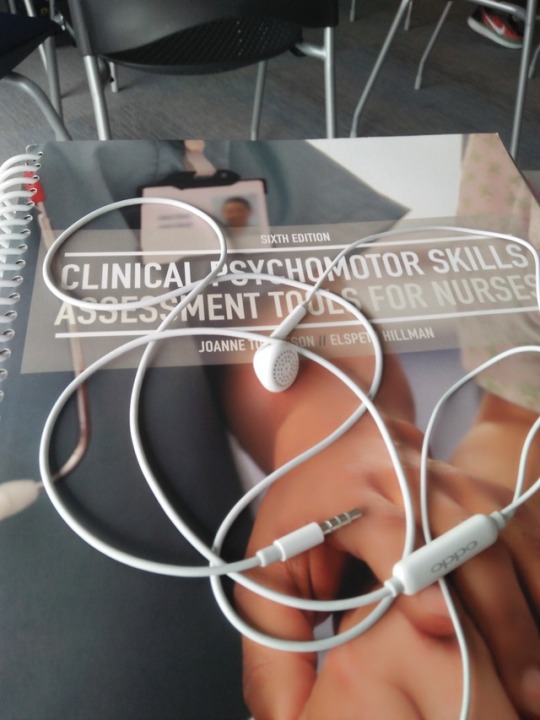Photo

! important !
remember that summer is meant to be a break from the stress of school, so don’t overwork yourself. these are some suggestions of small tasks to do each day when you have nothing else major to do.
if you miss a day, keep going! you don’t have to finish this in 30 consecutive days. if you are uncomfortable with a task, don’t do it. this is meant to guide you to keep on track in the summer, not force you to do busy work.
i. write all upcoming events on a calendar.
ii. choose an organization system.
iii. make a habit tracker.
iv. write 3 goals for the school year.
v. clear your email inbox.
vi. clear your askbox.
vii. clean your phone of photos and apps.
viii. clean your computer of files.
ix. clean your study space.
x. clean your backpack.
xi. clean your pencil case.
xii. clean your closet, or wherever you shove all your junk
xiii. establish a morning routine
xiv. establish an after school routine
xv. you’re halfway done! take a day for self care and find out what helps you the most.
xvi. find or make a study soundtrack.
xvii. if you haven’t already, make a studyblr! if you have one, redo it.
xviii. try meditation.
xix. find healthy recipes.
xx. find a fitness method that works for you and establish a fitness routine.
xxi. find a note taking method that works for you.
xxii. find resources for the subjects you’re taking next year.
xxiii. change your wallpapers to motivational ones.
xxiv. make a motivation wall.
xxv. go to the library or a book store.
xxvi. organize your bookshelf.
xxvii. write a bucket list.
xxviii. write a mission statement for your life.
xxix. find out what kind of person you are.
xxx. make a rewards list, then choose one to reward yourself with because you’ve finished the challenge! good job!
under the cut are post challenges with 2 options for each day and a printable version of the 30 day list and the 30 day blog challenge.
Keep reading
5K notes
·
View notes
Photo
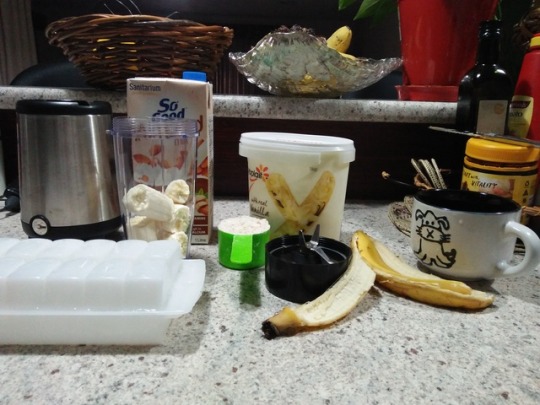
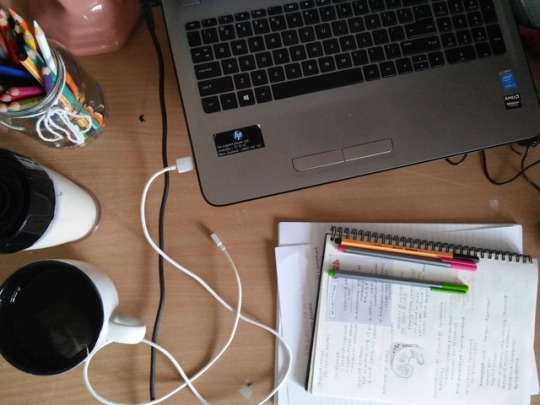
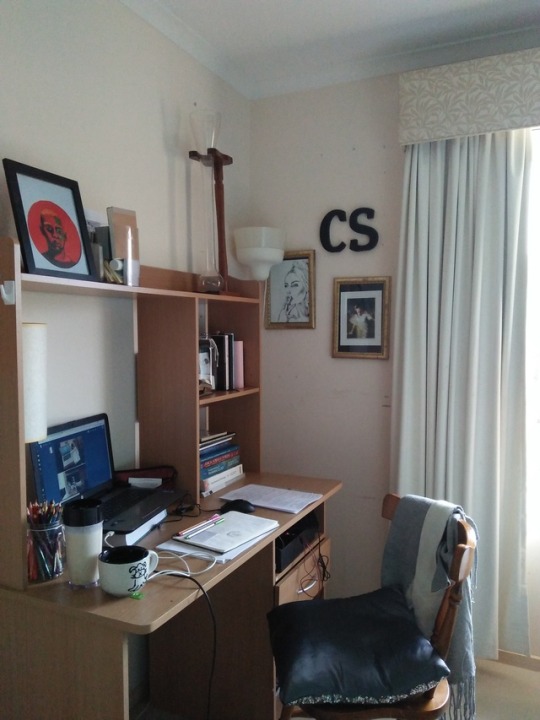

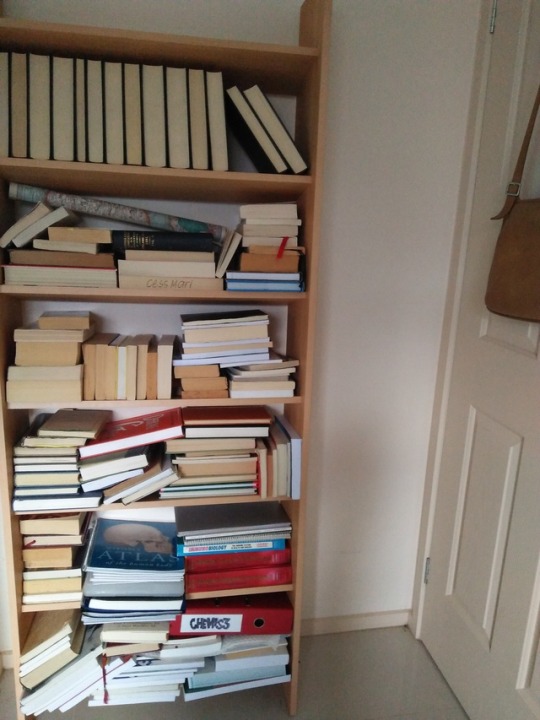
MORNING ROUTINE // revision days I try to wake up really early. Usually, 0600 in the morning. But today I woke up really late like 0800AM. So sprint to open my windows. I love the sunlight, it motivates me to be productive. Next I head down to the kitchen and today I decided to make a protein rich smoothie. Then I boiled water for my tea. It's winter so I like to drink tea like three cups a day at least. I had some cold water just wake me up more. Then I head back to my room and watch YouTube videos while having my breakfast. By 0915 I started to revise more. And Now I'm down to four more lectures then I can continue talking to myself. Yeah, I study like this and it's more effective. I'm an introvert so this works well with me. How's your day been?
#studyblr#studyspo#motivation#studio#science#love#medical#nurse#biology#human#disease#university#happiestplaceonearth
6 notes
·
View notes
Photo
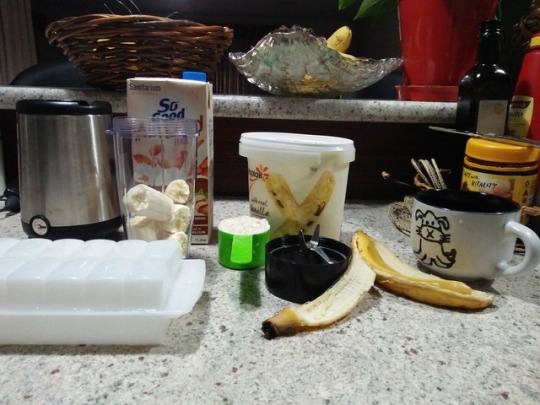
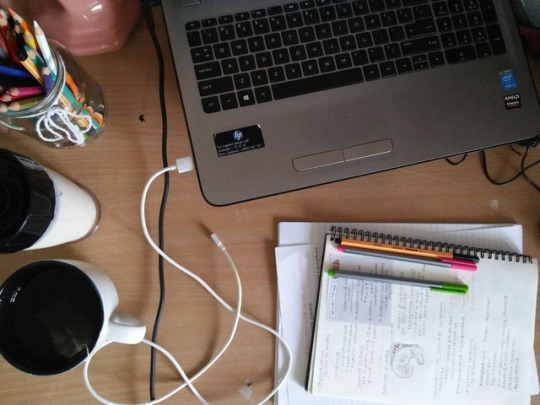
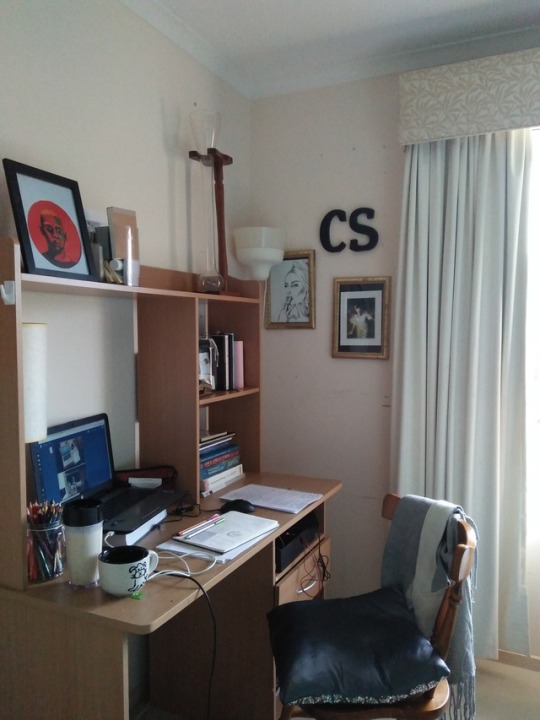

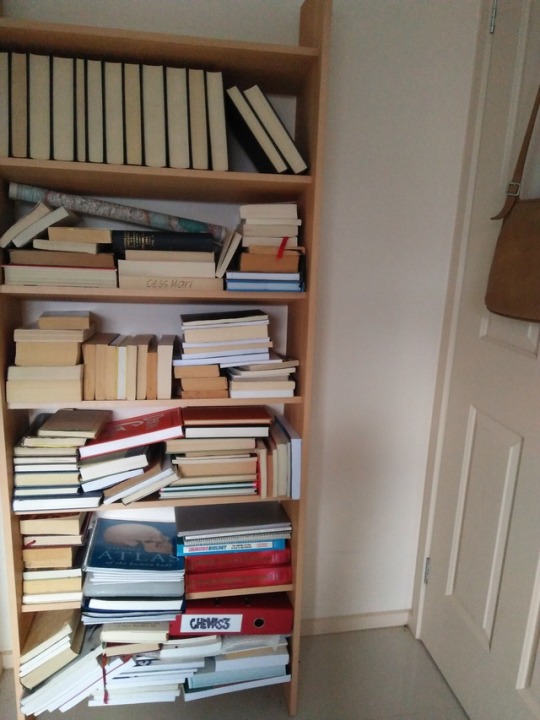
MORNING ROUTINE // revision days I try to wake up really early. Usually, 0600 in the morning. But today I woke up really late like 0800AM. So sprint to open my windows. I love the sunlight, it motivates me to be productive. Next I head down to the kitchen and today I decided to make a protein rich smoothie. Then I boiled water for my tea. It's winter so I like to drink tea like three cups a day at least. I had some cold water just wake me up more. Then I head back to my room and watch YouTube videos while having my breakfast. By 0915 I started to revise more. And Now I'm down to four more lectures then I can continue talking to myself. Yeah, I study like this and it's more effective. I'm an introvert so this works well with me. How's your day been?
#studyblr#studyspo#motivation#studio#science#love#medical#nurse#biology#human#disease#university#happiestplaceonearth
3 notes
·
View notes
Photo
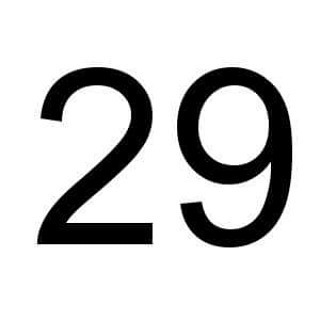
29th of December
A skeptic has concluded to be agnostic who prefer living with a free thought and has an atheistic opinion who values humanity above anything else.
CSMARI
#atheist #atheism #agnostic #skeptic #secularism #secular #humanity #humanist #rationalist #realist #logic #reason #love #unity #openess #happiness #one #borncatholic #raisedcatholic #chose #to #be #agnostic #atheist
1 note
·
View note
Photo


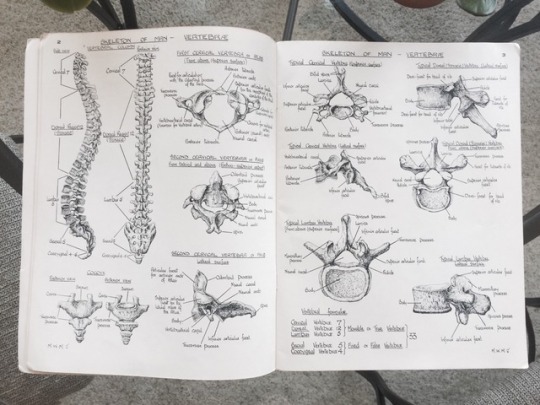


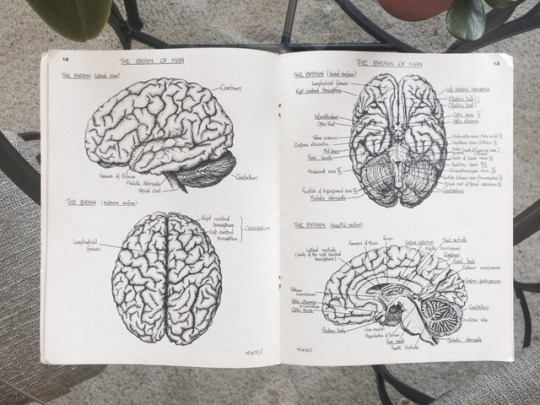

an anatomy book from the 1960′s my mom used during nursing school. i love the hand drawings and labels.
9K notes
·
View notes
Photo
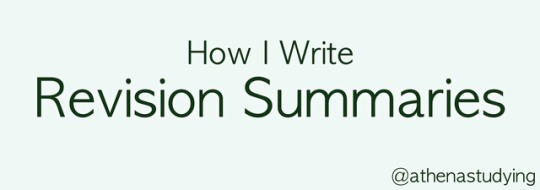
23 June 2017 ||
Hi!
Over the last few semesters, I developed my own system of revising for exams. I’m a visual learner and writing things down in an organised way helps me loads. I posted pictures of my exam notes several times before (here, here, here, here) and I use this format for basically every class that requires an exam instead of an essay - so far: calculus 1, real analysis, maths education, english literature, and teaching german as a second language. Many people really liked this format, so here’s a step-by-step guide on how I do it!
1. Supplies
I use:
blank A4 paper
one sheet of A4 grid paper
a black gel pen by Kyocera (you can use any pen, but it should have a somewhat fine tip and should dry easily)
Stabilo fine liners point88 (one or two matching colours per class)
a set square (imo that works better than a ruler)
a Faber-Castell 0.7 Grip 1347 pencil in 2B (you can use any pencil you like, but it should be HB or 2B because you need to erase it later)
lecture notes/slides, class notes, homework, basically any info that is necessary for the exam
2. Setup
Place the grid paper underneath the blank one. Make sure it doesn’t move when you write (if necessary, use paperclips to hold it in place).
Draw margins and aid lines (in pencil - you’ll erase these later). Measure them out so they’ll be the same on every sheet. I usually do approximately 1cm margins left, right, and bottom, 2.5cm margin at the top for title and subheading, and three columns: left one with a width of 6cm, middle one with 5cm, right one with 6cm and 0.5cm blank space between them. (The grid paper underneath will help.) You can also only make two columns - four columns is gonna be very hard though because that won’t leave you with much space.
Every time you have a list, bullet points, step-by-step guides etc, indent the bullets by another 0.5cm (draw another aid line for this). If you have sub-bullets, indent them another 0.5cm and so on.
I use colours for bullet points (the actual points /arrows /numbers/ whatever), important names, something that I’m defining, subheadings, and important dates.
3. Content
Start writing your notes. Make them as condensed as you possibly can without leaving important points out. I try to go for one A4 page per lecture (aka around 28 powerpoint slides or more on one page), but sometimes I’ll also end up with two.
Use abbreviations for words you use a lot, e.g. “+” for “and”, “p.” for “problem”, “str.” for “strategies”, “lit.” for “literature” etc.
You can absolutely include important diagrams/graphs etc. Either print them out in the size you need or draw them by hand and in the colours you need. If it doesn’t fit in one column, spread it out over two columns and continue the separated columns underneath/above.
Make your bullet points mean something. Use numbers, arrows, flags, lowercase letters, uppercase letters, dots - each can have a different meaning. Are you writing something where the order is important (numbers)? Are you giving examples (dots)? Are you mentioning separate important key points (flags)?
I wrote my last summary page for maths education today and stopped the time - I needed 50 minutes for one lecture with 27 slides (new material because I hadn’t been there), including a small chocolate break.
4. Final Touches
Check if the ink has dried. Check again.
Carefully erase the pencil aid lines with a good eraser. make sure you don’t wrinkle the paper (unless you don’t care about that sort of stuff haha)
If you want to, you can highlight key words (or whatever you like).
Number your pages if you’ll write several. I always write down the number of the lecture (session 1, session 2 etc) in the subheading.
Optional, but I do it: Make a copy of your sheet that you carry around with you. Nothing is as frustrating as spilling coffee over your revision sheets. Put the original in a plastic sleeve and keep it in a folder or binder somewhere, and study/revise only with the copy. Especially useful if you have others quizzing you with your summaries and they don’t care if they rip/wrinkle/ruin them lmao
I hope this was somewhat informative! You can tweak it of course, depending on what class you have and what will be on the exam. I hope you’re having a nice weekend! :)
1K notes
·
View notes
Text
🌼🌻study smarter🌻🌼
(here are some study tips straight from my psych notes)
1. interest: the brain prioritizes by meaning, value, and relevance so u remember things better if ur interested
find a study partner
do extra practice or research
teach it to someone else (this works so well!)
2. intent: be actively paying attention. very little learning actually takes place without attention
use a concentration check sheet (every time u get distracted, put a check on ur sheet. this is supposed to program ur mind to pay attention)
while u read, talk back to the author
ask questions during lectures (this is scary ik!! but do it!)
3. basic background: make connections to what u already know
preview and skim the material before u read it. or google it!
write out a list of vocab words before a lecture and leave some spaces between them to fill in during the lecture
read ahead of lectures
watch crashcourse tbh
4. selectivity: start by studying whats important
look for bolded words, graphics, pictures, chapter review questions in ur readings
listen for verbal clues like emphasis and repetition during lectures
make urself a study guide as u read and write down questions for urself to answer later as review (kinda like cornell notes)
5. meaningful organization: u can learn/rmr better if u group ideas into diff categories
apply vocab words to ur life
make flashcards and sort them (try not to have more than seven items in one category!)
use mnemonics
6. recitation: saying ideas aloud in ur own words strengthens synaptic connections! when u say something aloud u r forcing urself to pay attention
after u read, ask urself questions
talk abt what u learned w/ classmates outside of class
again, teach someone else
7. visualization: ur brain’s quickest and longest-lasting response is to images
convert info into a chart or graph
draw it out
make a mental video of a process
look at picture/video examples
8. association: memory is increased when facts are consciously associated w something u already know. memory = making neural connections
ask urself: is this something i already know?
9. consolidation: give ur brain some time to establish a neural pathway
make a list of what u remember from class
review notes at the end of the day, every day
stop after reading each prg to write a question in ur notes
make ur own practice quiz
10. distributed practice: we all know cramming doesnt work but we do it anyway! but yeah short and frequent study sections work better
make a daily/weekly study schedule
create a time budget/time tracker (track everything ur doing for a week and see how u can be more efficient w/ the time u waste)
divide the reading/vocab by the number of days before an exam and do a little bit each day (u can use sticky notes to divide ur reading)
other tips:
stop stressing! this sounds stupid and it isnt going to be easy, but anxiety causes u to lose focus. try ur best to think positively. sleep a lot. minimize ur caffeine intake. take a walk maybe
when u need to remember something, look upward or close ur eyes (when ur eyes are open ur using visual parts of ur brain that u might not need to be using)
find a rival! (like the person right above u in class rank) secretly compete w/ them (envy can improve mental persistence bc it makes u focus more intensely) but dont overdo it!
walking and sleeping build memory storage in ur brain
eat flavonoids! (grapes, berries, tea leaves, cocoa beans make neurons in the brain more capable of forming new memories + increase blood flow to the brain)
obstacles force ur brain to try harder, so space learning lessons apart or create a puzzle to solve or change ur physical setting
27K notes
·
View notes
Photo

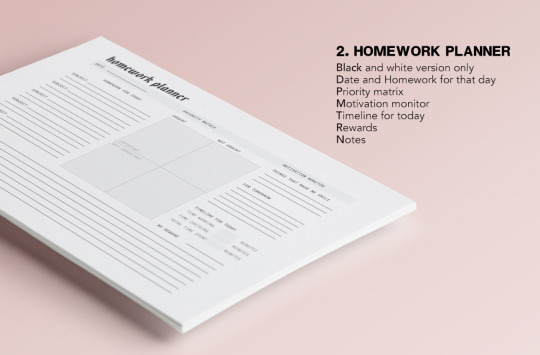
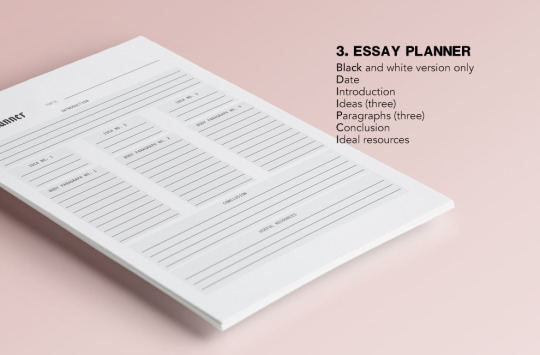
Printables: Homework, essay and project planners
Requested by @theatrebooknook
These ones took a while but I think it was worthwhile. Thanks for waiting.
Download in my dropbox studyblr folder.
* * *
Remember I’m presently working only with requests, instead of publishing random printables. If you have any suggestion or commentary, be sure to ask in my inbox. Have a nice week!
(Tagging mutuals, blogs I like shamelessly, etc)
@neko-with-roses @hazie @studyang @eliotwghs @alicewahlbrewer @helstudies @diyaanat @gardenstudy @carriefishervevo @i-speakcoffee @lawrelcrowns @study-bunni @ari6nna @studysheet @annistudio
18K notes
·
View notes
Photo
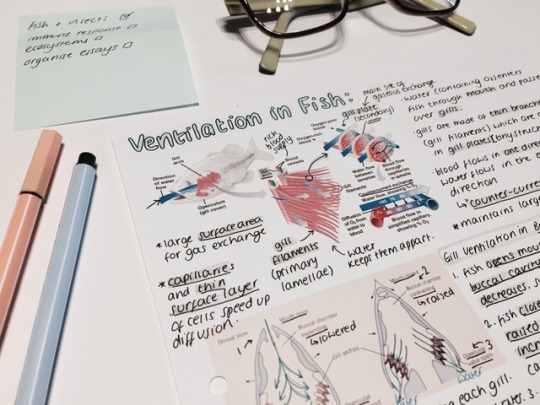
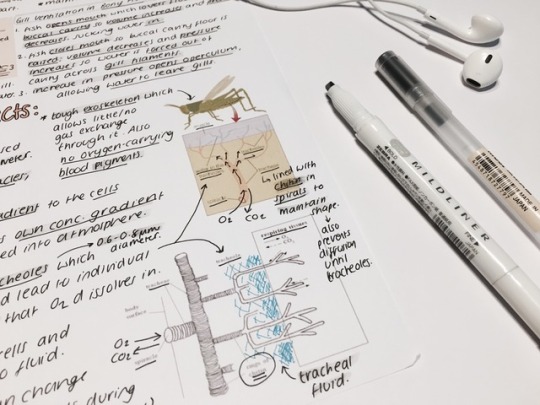
19.5.17 || ventilation in fish and insects 🐟🐜✨
3K notes
·
View notes
Photo

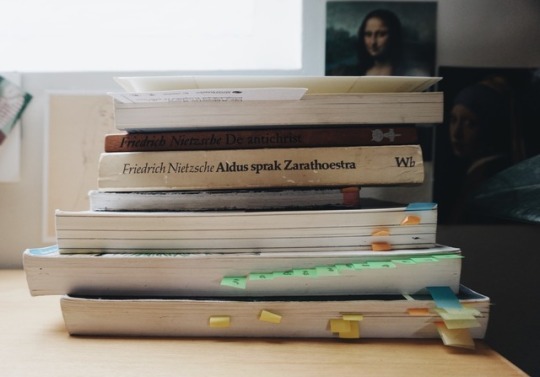

I don’t mind the rain as long as I’m comfortably inside with a cup of hot coffee…
11K notes
·
View notes
Photo


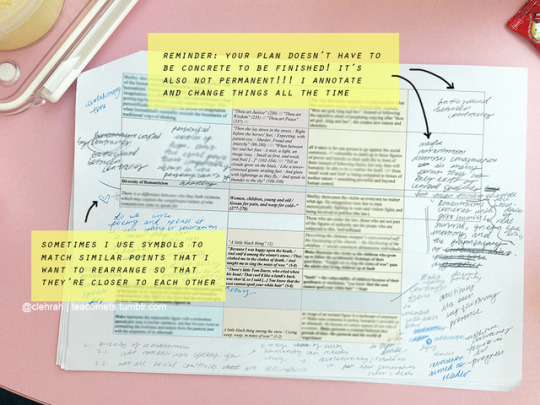



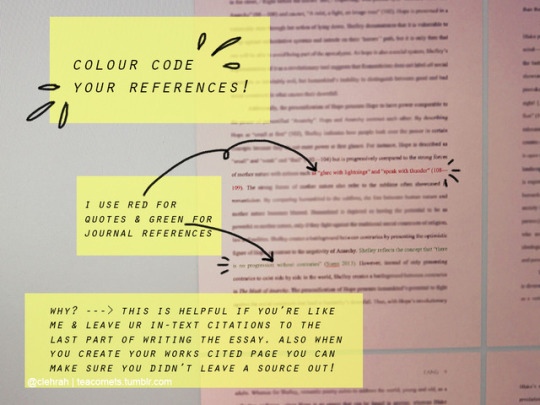
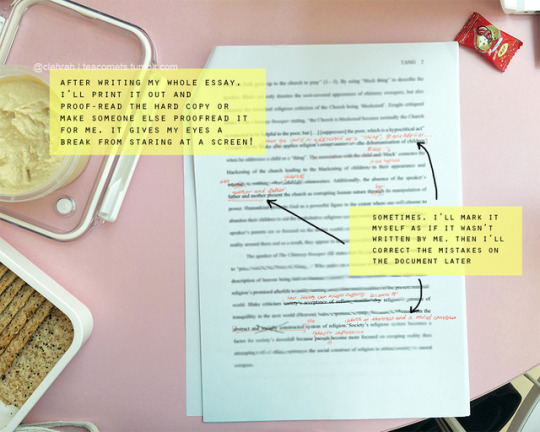
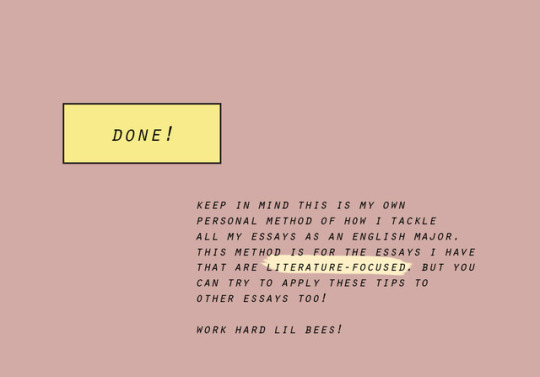
a small guide on how i battle my essays! (click on an image to view it clearer)
(keep in mind: i’m an english major so a majority of my essays are literature-focused!)
these are just some of the methods i want to share that work for me when i write my innumerable amount of essays! i’m definitely a huge planner so it’s no secret that i spend a lot of time on an essay. if you’re a deadline fighter, these tips might not necessarily be helpful (especially the handwriting one). but i hope this gives you an insight on how i write my essays! 🌈
30K notes
·
View notes
Photo
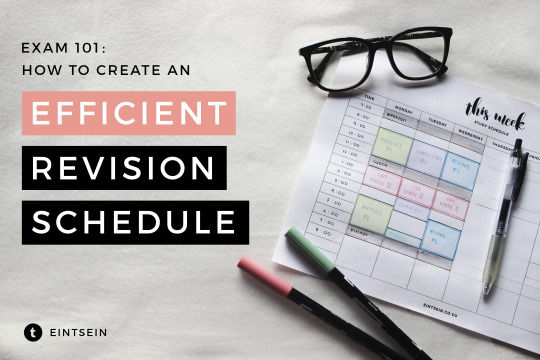
To be honest, I’m not the type of person to follow a strict schedule and have their entire day together. However, scheduling has allowed me to maximize my time and have more productive revision sessions. Aside from compelling you to actually start studying, scheduling takes into account your ability to retain information and sustain focus. Because they organize your revision according to your needs, studying becomes less threatening and less draining, ultimately making your study sessions more enjoyable.
What should I study first?
The first step might seem obvious, but it is also one that’s often overlooked: list down all the subjects you need to study and what exactly you’ll need to do for each of them. Are you simply going to revise the theory, practice from past papers, or both? At this point, you should probably have notes, flashcards, or other study materials ready to be revised, but if not, make sure that you schedule some time to write them. By identifying the specific tasks you have to accomplish, you’ll have a rough idea of how much load you’ll have.
The next thing you want to do is sort the subjects in order of priority, such as
Weakest to strongest
“Heavier” subjects first, i.e. those that require long hours of rigorous practice, revision, and memorization; or
According to your exam schedule.
Tackling your weakest subjects first would be the better option if there are topics you don’t fully understand yet. Because you have to spend time developing your understanding of the topics, your study sessions won’t comprise pure revision. This is perfectly fine; you should always make sure you’ve studied the topics before you revise them. The difference between studying and revising—although some people use the two interchangeably—is that revising serves to train your memory and ability to do the actual examination, while studying means obtaining knowledge about a particular subject.
If you’re sure you understand all the material on which you’ll be tested, you could opt for revising heavier subjects first. For example, I chose to revise Chemistry first because I need to memorize a lot of reactions. Earlier revision for chemistry also allows me to apply the technique of spaced repetition to enhance my memory. This also leaves me with plenty of time to do past papers to test my memory and knowledge.
How long should I spend revising?
Now you know what and how you need to revise, but how long do you need, exactly, to complete each of your tasks? The best way to do this is to try it out! If it’s not too late, have a ‘trial hour’, where you revise any subject/topic for an hour and see how much you can get done. This way, you can allocate suitable lengths of time to revise each topic in all the subjects you’re taking. For example, in a trial hour for physics, I managed to finish nuclear physics in 30 minutes, and 2/3 chapters of electricity. This means that longer topics like electricity would take me around 45 minutes, while shorter ones like nuclear physics would take me 30 minutes.
Time-blocking this way is great for when you’re under a time constraint, but if you still have a lot of time before your exams, I recommend allocating ‘study sessions’ in general (i.e. not for specific subjects/topics), which will be covered later.
You’ll also want to consider how long it normally takes you to do past papers if you plan on doing any. Maybe you’ve done past papers before and you’ve always finished ahead of time. I usually take 45 minutes to 1 hour to finish my Physics, Chemistry, and Mathematics paper, even though their allocated times are longer than that. I usually spend the rest of the time to mark the papers and analyze my mistakes. I believe it’s better to allocate time according to your speed in order to maximize your time, instead of using the actual time of the examination.
Ok, but when should I do these things?
The first thing you should consider is how your body’s energy levels change throughout the day, then you’ll be able to decide when to concentrate your most rigorous study. For example, I study best at around 9 – 11 am and 4 – 7 pm, during which I revise heavier subjects like Physics and Chemistry. On the other hand, my brain slows down at 1 – 3 pm, and during this period, I choose to practice Math or English, subjects that I believe I can still practice at a leisurely pace.
Next, think about your concentration habits. How long can you sustain focus before nothing gets into your head anymore? Before you feel drowsy and drained? This will determine how long you should study before you take a break. A lot of people use the Pomodoro method of studying for 25 minutes then taking a 5-minute break.
However, sometimes I just can’t stop studying or revising, and I would prefer to wrap up what I’m currently doing before taking a break and moving onto my next task. In other words, I prefer to divide my study content, as opposed to dividing my time. Luckily, revising a single topic usually takes me 40 minutes, after which I can take a 5-minute break.
Other people prefer to take more regular breaks, so that they may regain energy before continuing their revision. If you retain information better this way, then please do take regular breaks.
Should I study one subject the entire day or alternate every hour?
Again, this is entirely up to you. Sometimes people get tired of continuously studying a single subject, and their study sessions end up unproductive if they do so. If you feel the need for variety, then alternating would be best. But if you’re like me and have very high studying inertia, studying one subject the entire day would be better.
The same applies to studying theory and doing practice questions. Some people prefer to study some topics then do topical past papers, with the topics divided throughout the week. I prefer to revise all the topics in a day or two, then complete actual past papers the rest of the week.
What if I don’t stick to my schedule?
If you’re a P type (mbti) like me, you probably won’t. One of the most common problems I face is that when I’m supposed to be studying one subject, I feel like studying another. Well, let me tell you that this is alright, but to maximize your day, make sure that each activity has a flexible block. Alright, this is going to be a pain to explain, but I’ll try:
Let’s say you’re supposed to revise 5 chapters of physics today. 3 of these topics take 40 minutes to revise, and the other 2 take 15 minutes. You also want to take 5-minute breaks in between each chapter. This totals up to 170 minutes, or 2 hours and 50 minutes. I admit it’s pretty difficult to reschedule 2 hours and 50 minutes if nothing else on your schedule takes x hours and 10 minutes. The answer is simple: schedule a break. You’ll then have a whole number which is a lot easier to reschedule.
The second problem that could arise is that you fall behind. This is why you should always schedule a fallback hour or two at the end of the day in case your revision took longer than expected. I’ve also scheduled a fallback day in the past when I was studying for my IGCSEs, just because there was so much material to cover and I was reluctant that I could accomplish so much in so little time (a week).
If you don’t end up using your fallback hour/day to catch up, you could always use it for non-academic activities.
Recap/TLDR:
Know what you need to do for each subject
Prioritize your subjects
Allocate suitable lengths of time for each revision activity
Schedule study sessions according to your body’s energy levels
Your concentration habits should determine the length of each study session/block
Your study inertia or need for variety should determine the subjects you study in a day
Ensure that each activity has a flexible block by scheduling breaks
Set aside a couple hours or an entire day to catch up in case you fall behind schedule
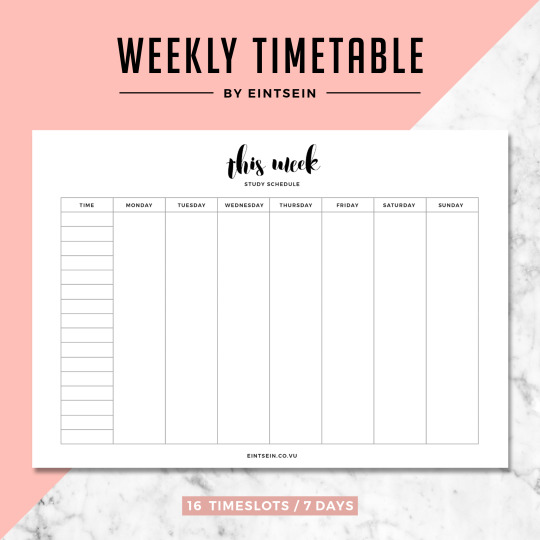
Now that you know how to schedule your revision, here’s a printable to help you out! It’s a simple, weekly planner with time slots, and an example of how to use it is shown in the photo below. I put 16 empty time slots because everyone has different active hours (e.g. mine is 7 am to 9 pm, others’ might be earlier or later), which makes this planner more flexible. Feel free to use it for other activities, too (aside from studying).
Download it here in my studyblr drive
Don’t forget to tag me (#eintsein) when you use it. Hope this post helps and best of luck in your studies!
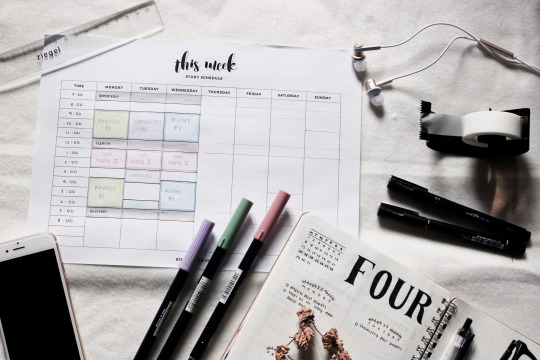
6K notes
·
View notes
Text
Work Smarter, Not Harder: study tips psychology taught me
study in shorter intervals and take breaks (ie, 40 minutes studying and 20 minutes break)
during your break don’t watch tv or surf the internet. get outside if you can and go for a walk. or at least listen to some instrumental music and walk around your hall. or meditate or do some art. anything that doesn’t require super directed attention. this allows your attention to be replenished. it’s like a muscle and you gotta give it time to rest. tv doesn’t allow for that.
relate the information to yourself and your life. creating visual images will improve your memory.
when studying, take notes by hand and put them in your own words. generating material yourself will encode the material better in your brain, and you’ll remember it better
don’t just reread, rehearse! quiz yourself on the materials. if you use a visual image “memory palace” technique, walk yourself through it. you’re likely to remember information you’ve tested yourself on better.
organizing information into groups that make sense create more connections in your brain and allow you to remember things better. the more meaningful connections you make, the better.
make sure the last thing you do before bed is study. no phone, no netflix. your brain will process what you’ve just done while you sleep and this improve recall.
(feel free to add any!)
27K notes
·
View notes
Photo
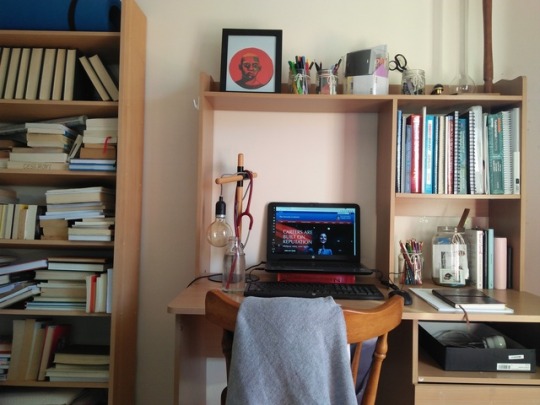
#study #space #book #read #words #educate #writer #student #life #light #education #love #writing #scientist #science #page #followforfollow #desk #art #coffeetime #photography #travel #enjoylife #enjoy #bestfriend #model #modeling #curlyhair #fitnessmotivation #poetrycommunity
0 notes
Photo
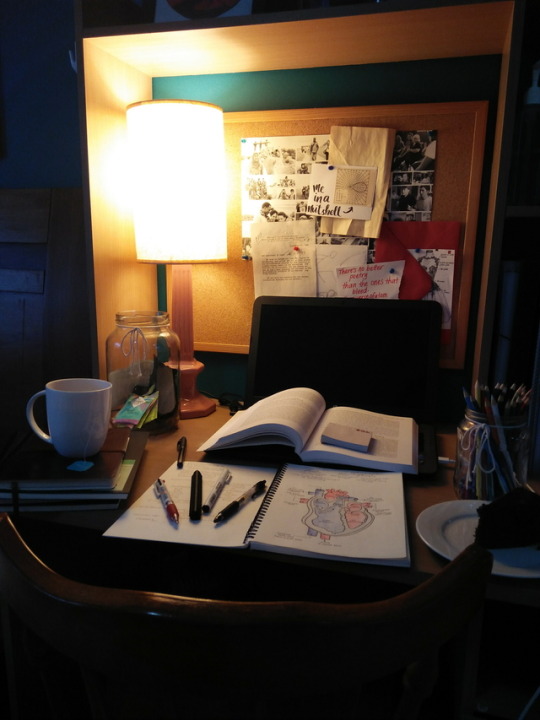
#study #space #book #read #words #educate #writer #student #life #light #education #love #writing #scientist #science #page #followforfollow #desk #art #coffeetime #photography #travel #enjoylife #enjoy #bestfriend #model #modeling #curlyhair #fitnessmotivation #poetrycommunity
1 note
·
View note
Photo
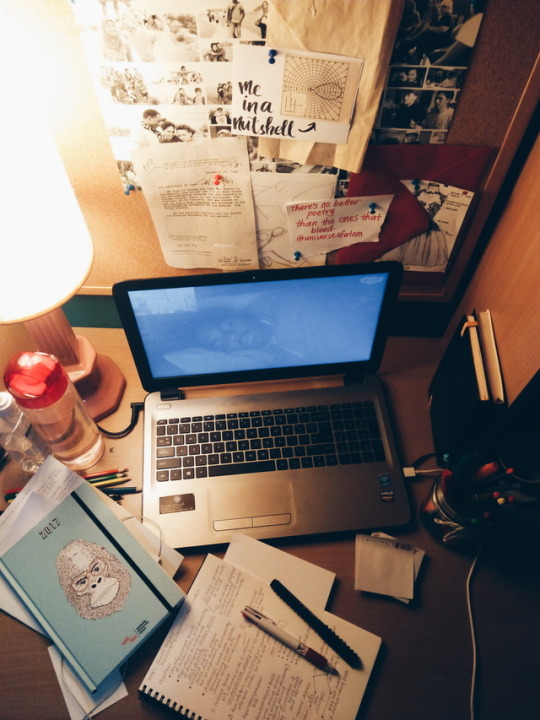
#study #space #book #read #words #educate #writer #student #life #light #education #love #writing #scientist #science #page #followforfollow #desk #art #coffeetime #photography #travel #enjoylife #enjoy #bestfriend #model #modeling #curlyhair #fitnessmotivation #poetrycommunity
2 notes
·
View notes
